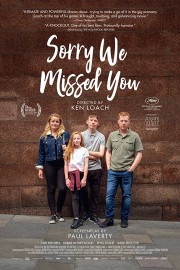Sorry We Missed You
If you’ve ever had to struggle with the stress of balancing family with putting food on your table for that family, Ken Loach’s “Sorry We Missed You” will gut you. It’s a perfect representation of the pressures of living paycheck-to-paycheck, trying to look out for your loved ones, and the difficult places that leads you. I thought it was really good, and then the last 30 minutes flattened me with how honest and personally they struck me.
The film begins with Ricky (Kris Hitchen) in the office of Maloney (Ross Brewster), who runs a depot for delivery drivers for a nationwide company. Hearing the way Maloney is talking, you would think that Ricky is opening his own business. The way he puts everything, from how Ricky looks at getting a vehicle for the job to how he’s being “onboarded” rather than hired to how he’s being put in charge of his van you’d swear was being given more responsibility than just delivering packages on a route. As someone whose worked for a large corporation for 18 years, and has seen the way employees are valued, I’ve heard this type of double-speak before, and it’s bullshit when the chips are down, a way to absolve the company of responsibility by putting the responsibility on you.
Ricky sees this as a way to make a good living- and I get it, believe me- but when it comes to getting the van for it, the financial strain is going to make it hard on his family. As his wife, Abbie (Debbie Honeywood), says, they’re already deep in debt, and she needs a vehicle to be able to get to her job, which is being an at-home nurse. But, Ricky needs the van if he’s going to make this work, so he sells the car, and Abbie is stuck taking the bus to her appointments. Things start going really well for Ricky, and Abbie makes a go at it, but when their son, Seb (Rhys Stone), starts acting up, and getting in trouble at school, the strain becomes more apparent. Even their daughter, Liza Jae (Katie Proctor), begins to be affected by the stress, which comes to a head in a way that threatens to ruin them all, especially if Ricky’s job is impacted.
The screenplay by Paul Laverty walks a very fine line between cliche and honesty as we see the family fall apart around Ricky, and the pressure it puts on Ricky. For about an hour, you almost feel as though you are watching a movie-of-the-week that wants to be “topical” and look at social issues. The characters are too honestly written, and performed with a sincerity that makes their actions feel real all around, for the film to fall into melodrama, however, even when Seb’s issues seem to become laughably predictable when it comes to school and his behavior. There’s nothing laughable about Loach’s film, though, which carries tremendous empathy for its characters, and their lives. Abbie loves her job, but being a caregiver means emotional exhaustion, and Ricky needs to help carry her, especially when it comes to their kids. But Ricky’s hours, and the way the company operates, means he cannot just take time off when he needs to without it reflecting poorly on him. And even though Liza is not going through the same things her family is, she is like Abbie, and the blowback comes back on her, and her anxiety rises, as well. This is a portrait of the working class than a lot of filmmakers try to accomplish, but Loach makes it look easy in his execution, and painful in how it impacts us.
The last 30 minutes of “Sorry We Missed You” are heartbreaking, and what you will find yourself coming back to most after watching the film. The pressure cooker this family has lived under comes to a boil, and becomes a powder keg of choices that change the game moving forward. The ramifications of those choices impact everything that happens the rest of the way, leading to a final one that is painful, but really, the only thing that can happen, under the circumstances. After all, there’s still a family to look after.










